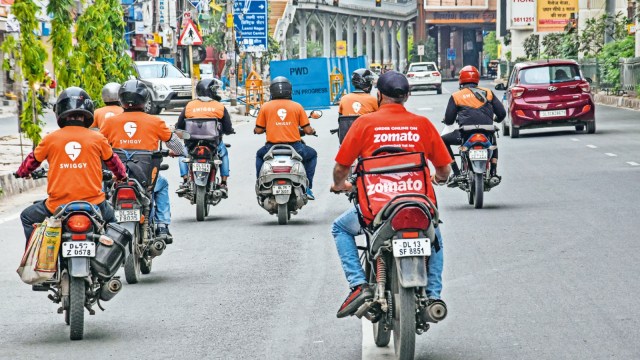June 15 deadline looming, five major service providers get on board cab aggregator policy
According to a senior transport official, around nine to 10 aggregators and delivery services providers had applied for the licence. All of them were issued the licence, the official said, adding they have got registered under the Delhi government.
 Gig workers employed by 12 major companies, including Amazon, Flipkart, Zomato, Swiggy, Ola, Uber, and Dunzo, will receive social security benefits once the Bill is enacted. (PTI file)
Gig workers employed by 12 major companies, including Amazon, Flipkart, Zomato, Swiggy, Ola, Uber, and Dunzo, will receive social security benefits once the Bill is enacted. (PTI file)With only three days to go before the deadline ends, five major delivery services providers — Ola, Uber, Zomato, Swiggy and Uncle Delivery — have registered and acquired licence under Delhi’s cab aggregator policy for providing delivery services and taxi services in the Capital.
According to a senior transport official, around nine to 10 aggregators and delivery services providers had applied for the licence. All of them were issued the licence, the official said, adding they have got registered under the Delhi government.
“Major players like Ola, Uber, Zomato, Swiggy and others have been issued licences and all of them have started boarding their vehicles on the portal…The last date to apply for the licence is June 15… As it is a major process, we are giving time to the aggregators and the delivery services providers to convert to electric vehicles gradually in a staggered manner…after that, enforcement drives to check for violations will be started,” said the official.
The Cab Aggregator and Delivery Services Provider Scheme was approved by Delhi Chief Minister Arvind Kejriwal in October last year; it was notified in November. The key aim of the policy is to “legalises bike taxis and outline comprehensive regulation and licensing of app based aggregators and delivery services providers”.
Under this policy, the bike taxis should only be electric.
However, the government has also set timelines for other modes of vehicles — both passenger services provider and delivery services provider — for transition into electric with a key aim to promote green and sustainable mobility in the city.
The government’s key aim under this policy is to convert the entire fleet of all the aggregators and delivery services providers into a fully electric fleet by 2030.
Although officials said that the transport department will not interfere with fare prices and surge pricing being set by the cab aggregators, Transport Minister Kailash Gahlot had said, while notifying the scheme, that action will be taken if a large number of complaints regarding surge pricing are received.
Under the scheme, all the cab operators/ e-commerce entities, who are running delivery services and passenger services, can only run two-, three- and four-wheelers, said an official, adding they cannot ply buses under this licence.
As per the notification, all the existing and the new operators had to obtain a licence within 90 days of the scheme’s notification or before commencing operations. The licences will be valid for five years, with annual fees applicable, and zero fees in case of electric vehicles. Additionally, a 50% rebate is provided for vehicles that are less than two years old.
Further, Gahlot had said that those flouting the guidelines will be penalised in the range of Rs 5,000 to Rs 1 lakh.
“It is the first time in India that aggregator guidelines have also defined phase-wise electrification targets for the operators… Overall, this scheme is a step towards enhancing public safety and convenience of Delhiites and features guidelines on vehicle cleanliness, driver behaviour, and timely resolution of customer complaints,” Gahlot had said.
The scheme will cover those with 25 or more motor vehicles (2W, 3W, and 4W, excluding buses) in their fleet, which use a digital intermediary such as an app or web portal to connect with consumers for their services.







